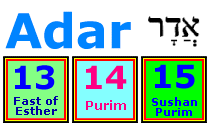Purim is celebrated on the day after the great battle in the Book of Esther, which is on the 14th of Adar.

In walled cities, such as Jerusalem it is celebrated on the 15th because the Jews had to defend the walled city of Shushan which was also walled for two days.
The four Mitzvot (requirements) of Purim
- Reading the Book of Esther out loud
- Being festive and rejoicing
- Giving Gifts of fruits and nuts
- Offering gifts to the poor
Traditionally the book of Esther is read out loud at synagogue twice on Purim: once at night and once during the day. The scroll is called a Megillah and it contains the story of Esther. The whole story is read for people to hear. One of the most fun things about the reading is that when the name of Haman is read out, people stamp their feet and make noise (many have noise makers for this) to drown out the evil name of the villain.
Many children, and grownups too, dress up in costumes for Purim. There are contests for the best costume, games, plays and fun for everyone.
Giving gifts of food (Mishalach Manot) to friends, family and neighbors is traditional. Fruit, nuts and hamantashen are the usual gifts.
Remembering the poor (Matanot l’evyonim) and giving to those less fortunate then you are.
The day before Purim is the fast of Esther. It is a minor fast which lasts from sunrise to nightfall. If it should happen to fall on Shabbat, then it is moved to a day earlier.
When did this all happen?
| Jewish Year | Civil Year | Historic Event |
| 3392 | 438 BCE | Ahasuerus becomes King of Persia |
| 3395 | 435 BCE | Ahasuerus’ feast (180 days) |
| 3399 | 431 BCE | (Tevet) Esther taken to Ahasuerus |
| 3404 | 426 BCE |
(Nisan) Haman casts lots (13 Nisan) First decrees issued by Haman (14-16 Nisan) Three days of fasts ordered by Esther (17 Nisan) Downfall and execution of Haman (23 Sivan) Second decree reversing the first |
| 3405 | 425 BCE |
(13 Adar) Hanan’s 10 sons executed (14 Adar) Purim Celebration (15 Adar) Purim Celebration in Shushan |
| 3406 | 424 BCE | Megillah recorded |
Purim celebrates a victory over those who sought to bring about our destruction. It is a victory of people over hatred and violence to others and trusting HaShem to make it possible if we do our part.

